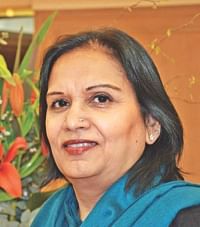Scientist Qadri on UN's tech panel
Scientist Qadri on UN's tech panel

UN Secretary General Ban Ki-moon has appointed Bangladeshi scientist Firdausi Qadri and nine others to a high-level panel to advise him on proposed Technology Bank aimed at helping the world's least developed countries emerge out of poverty.
A prominent immunologist, Qadri is now serving as director at the Centre for Vaccine Sciences of the International Centre for Diarrhoeal Disease Research, Bangladesh (ICDDR, B) and is an author of more than 200 peer-reviewed scientific papers.
She has over 25 years' experience of developing vaccines for cholera. Recently, she has developed a new technique to diagnose typhoid and paratyphoid fever.
Firdausi Qadri was awarded the 2013 CNR Rao Prize by The World Academy of Sciences (TWAS) in recognition of her significant contribution to the field of enteric diseases and mass immunisation against some common infectious diseases.
She received a Gold Medal for her outstanding research in biological sciences from Bangladesh Academy of Sciences in 2006 and the Institut de France's and Rodolphe Merieux Foundation Grand Prize in 2012.
Romain Murenzi, executive director of TWAS in Trieste, Italy and former minister of Rwanda, has been appointed as chair of the panel, according to a UN press release issued on Wednesday.
The UN General Assembly had made a request during the 68th session for a panel to examine the scope and functions of Technology Bank, its organisational aspects and institutional linkages with the UN.
The Istanbul Programme of Action for the least developed countries (LDCs), adopted during the UN conference in 2011, emphasized the need for the LDCs to acquire new technologies and build domestic capacity and a knowledge base to be able to fully utilise acquired technologies and to promote indigenous capacity on a sustainable basis.
Ban Ki-moon asked the panel to prepare practical recommendations on the matter, which can provide a strong impetus to accelerating structural transformation and sustainable development of the LDCs.